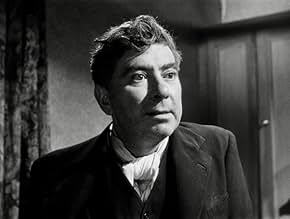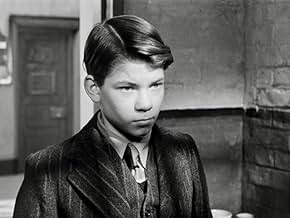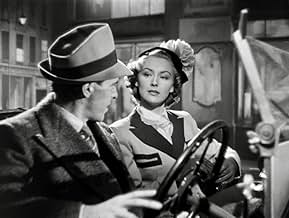A worthless sailor walks out on his young family leaving them to fend for themselves in the Liverpool slums. They make a go of their lives, but the eldest daughter is not happy when her fath... Read allA worthless sailor walks out on his young family leaving them to fend for themselves in the Liverpool slums. They make a go of their lives, but the eldest daughter is not happy when her father decides to return.A worthless sailor walks out on his young family leaving them to fend for themselves in the Liverpool slums. They make a go of their lives, but the eldest daughter is not happy when her father decides to return.
Kathleen Boutall
- Mrs. Duncan
- (uncredited)
John Boxer
- Policeman
- (uncredited)
Tony Britton
- Deck-Hand
- (uncredited)
Cyril Chamberlain
- Reporter
- (uncredited)
Richard Coke
- Pub Customer
- (uncredited)
Featured reviews
This is one of Michael Anderson's earliest films but already a masterpiece. It is like almost a documentary of very ordinary people living by the docks of Liverpool. The father, Robert Newton, is an irresponsible drunk who goes for the sea for fourteen years without once writing home to his family. His two daughters grow up in the meantime, the eldest taking on the responsibility for the family to make it survive with a father gone without ever sending any money home, but she finds the young Richard Burton, who already here makes a brilliant appearance in one of his first films. The other daughter is more flimsy and gets courted by a cad, Kenneth Grahame, always a pleasure to watch on screen, while the mother, Kathleen Harrison, as good as ever, keeps faithful to her wretched husband in good memory, and the drama begins in half of the film when he suddenly comes home after fourteen years. Nora, the eldest daughter, happens to be alone at home and is shocked to her bones to see him come back in the middle of the great depression, when everyone is out of work and money is more than scarce, and all her reasonable bitterness immediately flares up. He is thrown out, and there the tragedy begins, he not even knowing he has a son who was born after he had left.
It's a very humdrum but gripping drama with the fascinating environment of the Liverpool docks, reminding you of the tense atmosphere In films like "Odd Man Out" and "For Them That Trespass", similar classical down to earth films without any Hollywood lustre. Robert Newton as the pathetic father makes the deepest impression, but all the acting here is first class, giving a perfectly convincing insight into basic life at the old docklands of Liverpool. Adding to the charm is the somewhat striking accompaniment of music by Liszt ("The Preludes" above all.)
It's a very humdrum but gripping drama with the fascinating environment of the Liverpool docks, reminding you of the tense atmosphere In films like "Odd Man Out" and "For Them That Trespass", similar classical down to earth films without any Hollywood lustre. Robert Newton as the pathetic father makes the deepest impression, but all the acting here is first class, giving a perfectly convincing insight into basic life at the old docklands of Liverpool. Adding to the charm is the somewhat striking accompaniment of music by Liszt ("The Preludes" above all.)
Robert Newton slings his ditty on his shoulder, tells his elder daughter he's off on another voyage and walks off singing. He's not seen again for more than fourteen years. In the meantime, his wife, Kathleen Harrison, gives birth to his son, who turns out to be a swot. His daughter grow up into Avis Scott and Susan Shaw. Miss Scott gets engaged to Ship's engineer Richard Burton (in his third screen role)m who can't get a berth because of the downturn. Miss Shaw takes up with well-to-do Kenneth Griffith, who's looking for a good time with an easily impressed slum girl, Miss Harrison...well, she is worn out, bewildered, and hopeful.
It's an ambitious film from a novel by John Brophy, directed by Michael Alexander. You can tell by Liszt Prelude conducted by the London Symphony Orchestra that is offered as the opening and closing themes, and the graceful camerawork by Harry Waxman that swoops from the skies to show the dingy, worn-down Merseyside. The problem is, that while always watchable, and always well performed, the characters don't change, just the situations. Some will make their way out by talent, like Robin Netscher as Harrison's son, or by hard work, like Burton and Miss Shaw; some will sink into dust, like Miss Harrison and Miss Shaw. And some will be hanged, like Newton. But they can't change places. This sort of Greek tragedy isn't a story of people, but of fates.
It's an ambitious film from a novel by John Brophy, directed by Michael Alexander. You can tell by Liszt Prelude conducted by the London Symphony Orchestra that is offered as the opening and closing themes, and the graceful camerawork by Harry Waxman that swoops from the skies to show the dingy, worn-down Merseyside. The problem is, that while always watchable, and always well performed, the characters don't change, just the situations. Some will make their way out by talent, like Robin Netscher as Harrison's son, or by hard work, like Burton and Miss Shaw; some will sink into dust, like Miss Harrison and Miss Shaw. And some will be hanged, like Newton. But they can't change places. This sort of Greek tragedy isn't a story of people, but of fates.
Waterfront is an urban drama that takes place in and around the dock area of the United Kingdom's busiest seaport city Liverpool. My own first exposure to Liverpudlian culture comes from the Beatles. If you're not a resident of the UK I suspect that would be the same for anybody.
In fact knowing what little I know about the hardscrabble backgrounds of the Fab Four as kids this was an interesting film to watch if for no other reason than to see from where they sprung. Waterfront was in fact shot on location in Liverpool, in areas I suspect that had been restored somewhat to something approximating what they looked like before the Blitz.
I also suspect that the Lennon, Starkey, Harrison, and especially the McCartney families lived in such an area as the McCabes did. The action takes place between the World Wars and starts in 1919 when Robert Newton just decides one day to not come back from a sea voyage, deserting wife Kathleen Harrison and the two daughters and a babe on the way that neither of them know about.
Newton's character Peter McCabe would have been at home in a Eugene O'Neill play. In fact I suspect if O'Neill were British he might very well have made Liverpool his place of literary inspiration. Newton stays away for 15 years and then returns and doesn't even try to contact his family. For the rest all we'll say is it turns out very badly for him indeed.
The daughters are played by Avis Scott and Susan Shaw and its Scott's character who narrates the story and in whose eyes we view the proceedings. Both get involved with different men, Scott with young Richard Burton who was billed sixth in the cast and Shaw with the smooth and caddish Kenneth Griffith. The son that Newton never knew he had is played by young Robin Netscher who is a brilliant student even if he does have to fight a lot over slurs about his father.
Newton turns in a restrained and believable performance of a man with wanderlust and a lack of responsibility. Some similarities in his character with Yancy Cravat from both versions of Cimarron. For those who expect the eye rolling overacting that Newton is known for, you'll be disappointed. Harrison also is good as the working class mother trying to do right by her kids.
This review is dedicated to the Fab Four of Liverpool who put the city on the map worldwide in so many cultures and languages. I suspect that if Ringo Starr and Paul McCartney ever catch this film, they'll rate it as an accurate portrayal of the old home town.
In fact knowing what little I know about the hardscrabble backgrounds of the Fab Four as kids this was an interesting film to watch if for no other reason than to see from where they sprung. Waterfront was in fact shot on location in Liverpool, in areas I suspect that had been restored somewhat to something approximating what they looked like before the Blitz.
I also suspect that the Lennon, Starkey, Harrison, and especially the McCartney families lived in such an area as the McCabes did. The action takes place between the World Wars and starts in 1919 when Robert Newton just decides one day to not come back from a sea voyage, deserting wife Kathleen Harrison and the two daughters and a babe on the way that neither of them know about.
Newton's character Peter McCabe would have been at home in a Eugene O'Neill play. In fact I suspect if O'Neill were British he might very well have made Liverpool his place of literary inspiration. Newton stays away for 15 years and then returns and doesn't even try to contact his family. For the rest all we'll say is it turns out very badly for him indeed.
The daughters are played by Avis Scott and Susan Shaw and its Scott's character who narrates the story and in whose eyes we view the proceedings. Both get involved with different men, Scott with young Richard Burton who was billed sixth in the cast and Shaw with the smooth and caddish Kenneth Griffith. The son that Newton never knew he had is played by young Robin Netscher who is a brilliant student even if he does have to fight a lot over slurs about his father.
Newton turns in a restrained and believable performance of a man with wanderlust and a lack of responsibility. Some similarities in his character with Yancy Cravat from both versions of Cimarron. For those who expect the eye rolling overacting that Newton is known for, you'll be disappointed. Harrison also is good as the working class mother trying to do right by her kids.
This review is dedicated to the Fab Four of Liverpool who put the city on the map worldwide in so many cultures and languages. I suspect that if Ringo Starr and Paul McCartney ever catch this film, they'll rate it as an accurate portrayal of the old home town.
Every year, like most families I suppose, we watch Alistair Sim's A Christmas Carol in December. Part of me always thinks that the people in that movie aren't really actors, so you can imagine my surprise when I saw Mrs. Dilber make an appearance in another movie! Kathleen Harrison is her actress name, and not only is she the matriarch in Waterfront Women, but she has 113 credits to her name on IMDb. And she lived to the ripe old age of 103! Anyway, in Waterfront Women, Kathleen lives in seaside Liverpool. At the start of the movie, her seafaring husband leaves her, and shortly afterwards she gives birth to her third child. As the film continues, she works hard to provide singlehandedly for her family, all the while pining away for her husband and hoping he'll return to her.
Kathleen's two daughters grow up very differently. Avis Scott, the elder daughter, follows in her mother's footsteps. She's a hard worker, and against her better judgement, falls in love with a sailor, a very young and handsome Richard Burton. The younger daughter, Susan Shaw, flirts with bad boys and gets into trouble. All three Waterfront Women give very good performances, and the plot moves quickly, with lots of twists to keep you guessing. This is a great one to watch with your girlfriends on a rainy Saturday!
Kathleen's two daughters grow up very differently. Avis Scott, the elder daughter, follows in her mother's footsteps. She's a hard worker, and against her better judgement, falls in love with a sailor, a very young and handsome Richard Burton. The younger daughter, Susan Shaw, flirts with bad boys and gets into trouble. All three Waterfront Women give very good performances, and the plot moves quickly, with lots of twists to keep you guessing. This is a great one to watch with your girlfriends on a rainy Saturday!
Given that this film was set in Liverpool what one has to ask is why are the actors all using different accents.For some reason the director clearly equates anywhere up North with a mancunian accent instead of the scouse accent.Of course dear old Robert Newton eyes rolling in anticipation of his part as Long John Silver,veers from Cockney to mumerset.Newton was such a fine actor your attention is drawn to him from beginning to end.He is supported by such a great cast.A very young Richrad Burton as a jobless ships engineer,Kathleen Harrison as the usual harassed mother and Kenneth Griffiths playing what one assumes to be a spiv.The camera work is first class particularly eye catching being the fight outside the pub.One could almost call this a British film noir.This film is sadly neglected and doesn't get any showing on TV.
Did you know
- TriviaRobert Newton and Richard Burton appear together again three years later in "The Desert Rats" only this time Burton has top billing.
- Quotes
Nora McCabe: And that is good chuckance to bad rubbish.
- SoundtracksLes Preludes
Music from Franz Liszt (as Liszt)
Played by London Symphony Orchestra (as The London Symphony Orchestra)
Director of Music Muir Mathieson
- How long is Waterfront Women?Powered by Alexa
Details
- Runtime1 hour 20 minutes
- Color
- Aspect ratio
- 1.37 : 1
Contribute to this page
Suggest an edit or add missing content
































